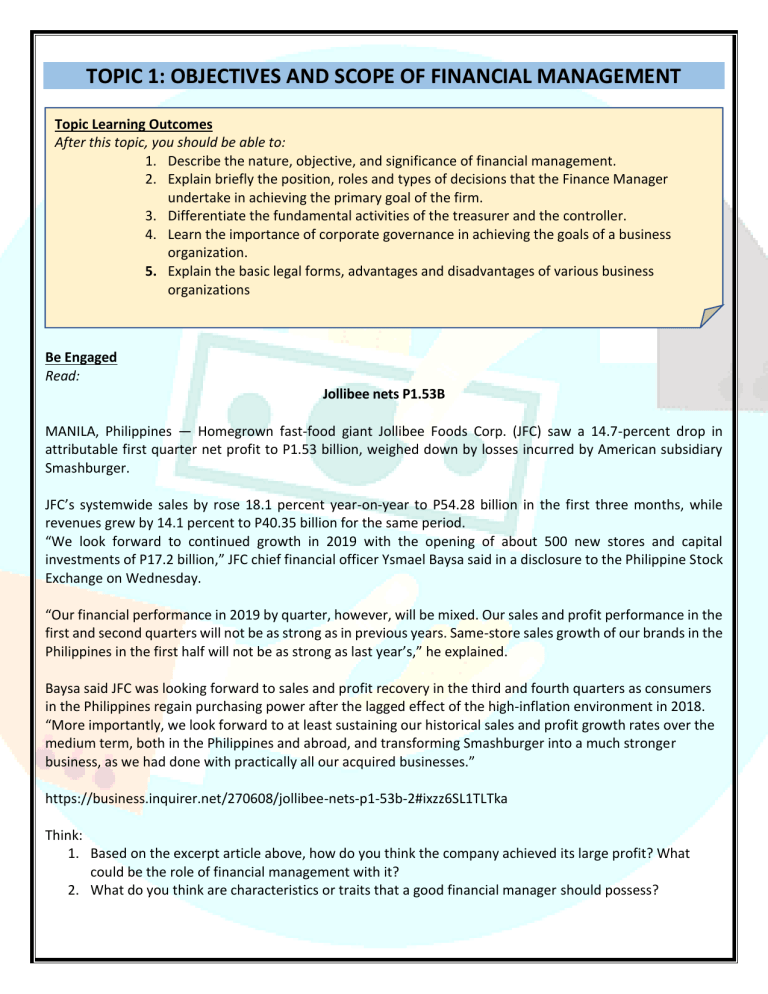
TOPIC 1: OBJECTIVES AND SCOPE OF FINANCIAL MANAGEMENT Topic Learning Outcomes After this topic, you should be able to: 1. Describe the nature, objective, and significance of financial management. 2. Explain briefly the position, roles and types of decisions that the Finance Manager undertake in achieving the primary goal of the firm. 3. Differentiate the fundamental activities of the treasurer and the controller. 4. Learn the importance of corporate governance in achieving the goals of a business organization. 5. Explain the basic legal forms, advantages and disadvantages of various business organizations Be Engaged Read: Jollibee nets P1.53B MANILA, Philippines — Homegrown fast-food giant Jollibee Foods Corp. (JFC) saw a 14.7-percent drop in attributable first quarter net profit to P1.53 billion, weighed down by losses incurred by American subsidiary Smashburger. JFC’s systemwide sales by rose 18.1 percent year-on-year to P54.28 billion in the first three months, while revenues grew by 14.1 percent to P40.35 billion for the same period. “We look forward to continued growth in 2019 with the opening of about 500 new stores and capital investments of P17.2 billion,” JFC chief financial officer Ysmael Baysa said in a disclosure to the Philippine Stock Exchange on Wednesday. “Our financial performance in 2019 by quarter, however, will be mixed. Our sales and profit performance in the first and second quarters will not be as strong as in previous years. Same-store sales growth of our brands in the Philippines in the first half will not be as strong as last year’s,” he explained. Baysa said JFC was looking forward to sales and profit recovery in the third and fourth quarters as consumers in the Philippines regain purchasing power after the lagged effect of the high-inflation environment in 2018. “More importantly, we look forward to at least sustaining our historical sales and profit growth rates over the medium term, both in the Philippines and abroad, and transforming Smashburger into a much stronger business, as we had done with practically all our acquired businesses.” https://business.inquirer.net/270608/jollibee-nets-p1-53b-2#ixzz6SL1TLTka Think: 1. Based on the excerpt article above, how do you think the company achieved its large profit? What could be the role of financial management with it? 2. What do you think are characteristics or traits that a good financial manager should possess? 3. Do you think the top managers plays a big role in its success equally to the managers that manages their staffs in their fast foods store? 4. Will a sole proprietor business can achieve a vast amount of profit as this company reached? Why or why not? 5. If you are an investor, are you going to invest in this company? Why or why not? Let’s Discuss 1. Nature, purpose, and scope of financial management 2. Functions of Financial Management – Role of financial managers o Investment decision o Operating decision o Financing decision 3. Forms of Business Organizations 4. Governance and Agency 6. Business Ethics An Overview of Financial Management What Is Finance? • The science and art of managing money. • In personal level, o it is concerned with individuals’ decisions about how much of their earnings they spend, how much they save, and how they invest their savings • business context o this involves the same types of decisions how firms raise money from investors, how firms invest money in an attempt to earn a profit, and how they decide whether to reinvest profits in the business or distribute them back to investors. Areas of Finance (1) financial management a. also known as corporate finance b. the process of planning, leading, organizing, controlling, and monitoring monetary resource so the company achieve its goals c. focuses on decisions relating to how much and what types of assets to acquire, how to raise the capital needed to purchase assets, and how to run the firm so as to maximize its value (2) capital markets a. relate to the markets where interest rates, along with stock and bond prices, are determined b. it covers the financial institutions that supply capital to businesses (3) investments a. this relates to decisions concerning stocks and bonds and activities like: i. Security analysis 1. the proper valuation of individual securities ii. Portfolio theory 1. How to or the way to structure portfolios, or “baskets,” of stocks and bonds iii. Market analysis 1. issue of whether stock and bond markets at any given time are “too high,” “too low,” or “about right.” 2. This also deals with behavioral finance Alternative Forms of Business Organization • • • Sole proprietorship Partnership Corporation Advantages and Disadvantages of the Major forms of business organization Financial Goals of the Corporation • The primary financial goal is shareholder wealth maximization, which translates to maximizing stock price. Role of Finance in a Typical Business Organization Roles of Financial Managers within a corporation Financial Manager Treasurer Controller Chief Finance Officer (CFO) Board of Directors (BOD) Role/ Responsibility Focuses on the Financial Perspective of a firm Focuses on Accounting and Compliance aspect Setting Corporate Strategies Makes important financial decisions Responsibility of the Finance Department • Maximize stock value by: o Forecasting and planning o Investment and financing decisions o Coordination and control o Transactions in the financial markets o Managing risk General roles of financial managers a. Financing Decision a. This focuses on acquiring or raising funds for the company b. The managers seek ways to raise capital at lowest possible cost b. Investing Decision a. This focuses on capital budgeting decisions b. “What profitable projects to invest into?” c. Operating Decision a. Allocation of resources within the firm b. This deals mostly with daily transactions – screening, monitoring, among others Query: is stock price maximization the same as profit maximization? • • • No, despite a generally high correlation amongst stock price, EPS, and cash flow. Current stock price relies upon current earnings, as well as future earnings and cash flow. Some actions may cause an increase in earnings yet cause the stock price to decrease (and vice versa). Agency relationships • • An agency relationship exists whenever a principal hires an agent to act on their behalf. Within a corporation, agency relationships exist between: A. Shareholders versus Managers • Managers are naturally inclined to act in their own best interests. • The following factors affect managerial behavior: o Managerial compensation plans o Direct intervention by shareholders o The threat of firing o The threat of takeover B. Shareholders versus Creditors (Debtholders) • Shareholders (through managers) could take actions to maximize stock price that are detrimental to creditors. • In the long run, such actions will raise the cost of debt and ultimately lower stock price. Ethical Consideration Business ethics • Standards of conduct or moral judgment that apply to persons engaged in commerce • An effective ethics program o can enhance corporate o can reduce potential litigation and judgment costs o maintain a positive corporate image o build shareholder confidence, o gain the loyalty, commitment, and respect of the firm’s stakeholders • Ethics and maximization of goal should lean towards similar end • Ethical behavior is viewed as necessary in achieving the organization’s ultimate goal – wealth maximization Career Opportunities in Finance References Gitman, L. J., & Zutter, C. J. (2015). Principles of Managerial Finance. Pearson Education Limited. Brigham, E. F., & Houston, J. F. (2019). Fundamentals of Financial Management. Cengege. Bagayao, I. Y., & et al. (n.d.). Financial Management Volume 1. Bagayao, I. S., & et al. (n.d.). Financial Management Volume 2. Other online resources https://courses.lumenlearning.com/boundless-business/chapter/introduction-to-financial-management/ https://www.youtube.com/watch?v=TVLhPcdo-j8




